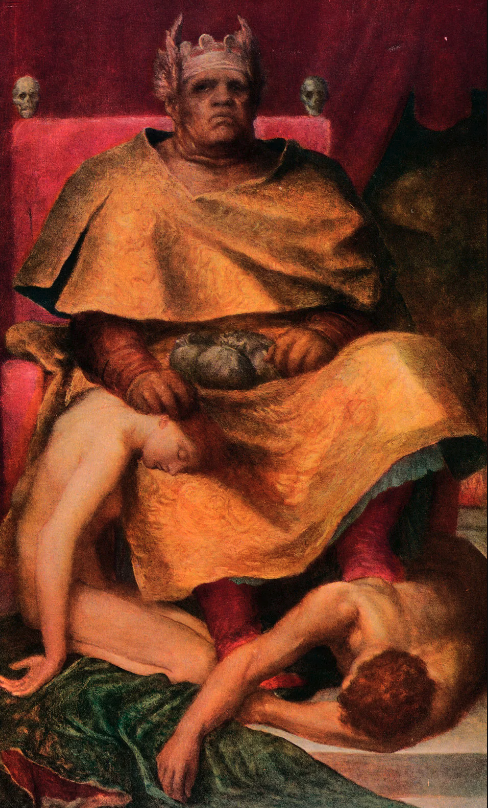Mammon
Mammon in the New Testament of the Bible is commonly thought to mean money, material wealth, or any entity that promises wealth, and is associated with the greedy pursuit of gain. The Gospel of Matthew and the Gospel of Luke both quote Jesus Christ using the word in a phrase often rendered in English as "You cannot serve both God and mammon."
In the Middle Ages, it was often personified and sometimes included in the hierarchy of Hell. Mammon in Hebrew (ממון) means "money." The word was adopted to modern Hebrew to mean wealth.
Biblical history
The word Mammon comes into English from post-classical Latin mammona ("wealth"), used most importantly in the Vulgate Bible (along with Tertullian's mammonas and pseudo-Jerome's mammon). This was in turn borrowed from Hellenistic Greek μαμωνᾶς, which appears in the New Testament, borrowed from Aramaic מָמוֹנָא māmōnā, an emphatic form of the word māmōn meaning "wealth" or "profit."
According to the Textus Receptus of the New Testament, the Greek word translated "Mammon" is spelt μαμμωνᾷ in the Sermon on the Mount at Matthew 6:24, and μαμωνᾶ (from μαμωνᾶς) in the Parable of the Unjust Steward at Luke 16:9,11,13. The 27th edition of the popular Critical Text of the New Testament has μαμωνᾶ in all four places with no indication of any textual variances, thereby ignoring the Textus Receptus reading at Matthew 6:24. The Liddell and Scott Lexicon has a listing for each spelling, indicating that each occurs only in the New Testament, nowhere else in ancient and Hellenistic Greek literature. The spelling μαμμωνᾷ refers to "a Syrian deity, god of riches; Hence riches, wealth"; μαμωνᾶς is transliterated from Aramaic [ממון] and also means "wealth."
Syrian god
The spelling μαμμωνᾷ supposedly refers to "a Syrian deity, god of riches; Hence riches, wealth"; μαμωνᾶς is transliterated from Aramaic [ממון] and also means "wealth." The word is unknown in Old Testament Hebrew, but has been found in the Qumran documents; post-biblical Hebrew attests to māmōn; and, according to Augustine of Hippo, Punic included the word mammon in the definition of "profit." It has been suggested that the Aramaic word māmōn was a loanword from Mishnaic Hebrew ממון (mamôn) meaning money, wealth, or possessions; although it may also have meant "that in which one trusts."
Albert Barnes in his Notes on the New Testament states that Mammon was a Syriac word for an idol worshipped as the god of riches, similar to Plutus among the Greeks, but he cited no authority for the statement. No trace, however, of any Syriac god of such a name exists.
Beliefs
Gregory of Nyssa asserted that Mammon was another name for Beelzebub. In the 4th century Cyprian and Jerome relate Mammon to greed and greed as an evil master that enslaves, and John Chrysostom even personifies Mammon as greed. Descriptions of Mammon closely resemble those of Lucifuge Rofocale as a demon who delivers wealth in The Grand Grimoire.
During the Middle Ages, Mammon was commonly personified as the demon of wealth and greed. Thus Peter Lombard (II, dist. 6) says, "Riches are called by the name of a devil, namely Mammon, for Mammon is the name of a devil, by which name riches are called according to the Syrian tongue." Piers Plowman also regards Mammon as a deity. Nicholas de Lyra, commenting on the passage in Luke, says: "Mammon est nomen daemonis" (Mammon is the name of a demon).
Mammon is somewhat similar to the Greek god Plutus, and the Roman god Dis Pater, in his description, and it is likely that he was at some point based on them; especially since Plutus appears in Dante's The Divine Comedy as a wolf-like demon of wealth, wolves having been associated with greed in the Middle Ages. Thomas Aquinas metaphorically described the sin of Avarice as "Mammon being carried up from Hell by a wolf, coming to inflame the human heart with Greed."
Popular culture
The common literary identification of the name with a god of covetousness or avarice likely stems from Spenser's The Faerie Queene, where Mammon oversees a cave of worldly wealth.
Milton's Paradise Lost describes a fallen angel who values earthly treasure over all other things.
Later occult writings such as Jacques Collin de Plancy's Dictionnaire Infernal describe Mammon as Hell's ambassador to England.
